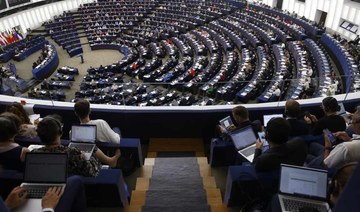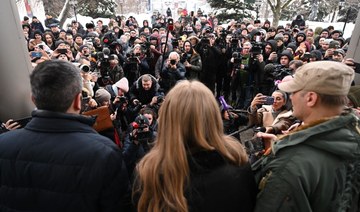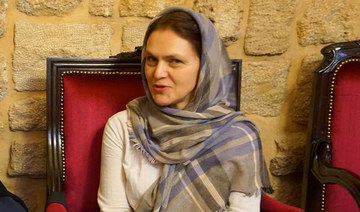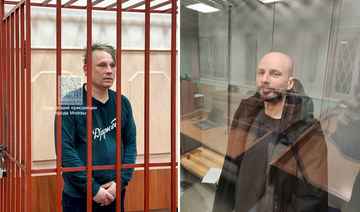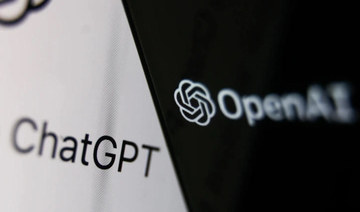DUBAI: As the Gaza war raged and tensions surged across the Middle East last May, Instagram briefly banned the hashtag #AlAqsa, a reference to the Al-Aqsa Mosque in Jerusalem’s Old City, a flash point in the conflict.
Facebook, which owns Instagram, later apologized, explaining its algorithms had mistaken the third-holiest site in Islam for the militant group Al-Aqsa Martyrs Brigade, an armed offshoot of the secular Fatah party.
For many Arabic-speaking users, it was just the latest potent example of how the social media giant muzzles political speech in the region. Arabic is among the most common languages on Facebook’s platforms, and the company issues frequent public apologies after similar botched content removals.
Now, internal company documents from the former Facebook product manager-turned-whistleblower Frances Haugen show the problems are far more systemic than just a few innocent mistakes, and that Facebook has understood the depth of these failings for years while doing little about it.
Such errors are not limited to Arabic. An examination of the files reveals that in some of the world’s most volatile regions, terrorist content and hate speech proliferate because the company remains short on moderators who speak local languages and understand cultural contexts. And its platforms have failed to develop artificial-intelligence solutions that can catch harmful content in different languages.
In countries like Afghanistan and Myanmar, these loopholes have allowed inflammatory language to flourish on the platform, while in Syria and the Palestinian territories, Facebook suppresses ordinary speech, imposing blanket bans on common words.
“The root problem is that the platform was never built with the intention it would one day mediate the political speech of everyone in the world,” said Eliza Campbell, director of the Middle East Institute’s Cyber Program. “But for the amount of political importance and resources that Facebook has, moderation is a bafflingly under-resourced project.”
This story, along with others published Monday, is based on Haugen’s disclosures to the Securities and Exchange Commission, which were also provided to Congress in redacted form by her legal team. The redacted versions were reviewed by a consortium of news organizations, including The Associated Press.
In a statement to the AP, a Facebook spokesperson said that over the last two years the company has invested in recruiting more staff with local dialect and topic expertise to bolster its review capacity around the world.
But when it comes to Arabic content moderation, the company said, “We still have more work to do. ... We conduct research to better understand this complexity and identify how we can improve.”
In Myanmar, where Facebook-based misinformation has been linked repeatedly to ethnic and religious violence, the company acknowledged in its internal reports that it had failed to stop the spread of hate speech targeting the minority Rohingya Muslim population.
The Rohingya’s persecution, which the US has described as ethnic cleansing, led Facebook to publicly pledge in 2018 that it would recruit 100 native Myanmar language speakers to police its platforms. But the company never disclosed how many content moderators it ultimately hired or revealed which of the nation’s many dialects they covered.
Despite Facebook’s public promises and many internal reports on the problems, the rights group Global Witness said the company’s recommendation algorithm continued to amplify army propaganda and other content that breaches the company’s Myanmar policies following a military coup in February.
In India, the documents show Facebook employees debating last March whether it could clamp down on the “fear mongering, anti-Muslim narratives” that Prime Minister Narendra Modi’s far-right Hindu nationalist group, Rashtriya Swayamsevak Sangh, broadcasts on its platform.
In one document, the company notes that users linked to Modi’s party had created multiple accounts to supercharge the spread of Islamophobic content. Much of this content was “never flagged or actioned,” the research found, because Facebook lacked moderators and automated filters with knowledge of Hindi and Bengali.
Arabic poses particular challenges to Facebook’s automated systems and human moderators, each of which struggles to understand spoken dialects unique to each country and region, their vocabularies salted with different historical influences and cultural contexts.
The Moroccan colloquial Arabic, for instance, includes French and Berber words, and is spoken with short vowels. Egyptian Arabic, on the other hand, includes some Turkish from the Ottoman conquest. Other dialects are closer to the “official” version found in the Qur’an. In some cases, these dialects are not mutually comprehensible, and there is no standard way of transcribing colloquial Arabic.
Facebook first developed a massive following in the Middle East during the 2011 Arab Spring uprisings, and users credited the platform with providing a rare opportunity for free expression and a critical source of news in a region where autocratic governments exert tight controls over both. But in recent years, that reputation has changed.
Scores of Palestinian journalists and activists have had their accounts deleted. Archives of the Syrian civil war have disappeared. And a vast vocabulary of everyday words have become off-limits to speakers of Arabic, Facebook’s third-most common language with millions of users worldwide.
For Hassan Slaieh, a prominent journalist in the blockaded Gaza Strip, the first message felt like a punch to the gut. “Your account has been permanently disabled for violating Facebook’s Community Standards,” the company’s notification read. That was at the peak of the bloody 2014 Gaza war, following years of his news posts on violence between Israel and Hamas being flagged as content violations.
Within moments, he lost everything he’d collected over six years: personal memories, stories of people’s lives in Gaza, photos of Israeli airstrikes pounding the enclave, not to mention 200,000 followers. The most recent Facebook takedown of his page last year came as less of a shock. It was the 17th time that he had to start from scratch.
He had tried to be clever. Like many Palestinians, he’d learned to avoid the typical Arabic words for “martyr” and “prisoner,” along with references to Israel’s military occupation. If he mentioned militant groups, he’d add symbols or spaces between each letter.
Other users in the region have taken an increasingly savvy approach to tricking Facebook’s algorithms, employing a centuries-old Arabic script that lacks the dots and marks that help readers differentiate between otherwise identical letters. The writing style, common before Arabic learning exploded with the spread of Islam, has circumvented hate speech censors on Facebook’s Instagram app, according to the internal documents.
But Slaieh’s tactics didn’t make the cut. He believes Facebook banned him simply for doing his job. As a reporter in Gaza, he posts photos of Palestinian protesters wounded at the Israeli border, mothers weeping over their sons’ coffins, statements from the Gaza Strip’s militant Hamas rulers.
Criticism, satire and even simple mentions of groups on the company’s Dangerous Individuals and Organizations list — a docket modeled on the US government equivalent — are grounds for a takedown.
“We were incorrectly enforcing counterterrorism content in Arabic,” one document reads, noting the current system “limits users from participating in political speech, impeding their right to freedom of expression.”
The Facebook blacklist includes Gaza’s ruling Hamas party, as well as Hezbollah, the militant group that holds seats in Lebanon’s Parliament, along with many other groups representing wide swaths of people and territory across the Middle East, the internal documents show, resulting in what Facebook employees describe in the documents as widespread perceptions of censorship.
“If you posted about militant activity without clearly condemning what’s happening, we treated you like you supported it,” said Mai el-Mahdy, a former Facebook employee who worked on Arabic content moderation until 2017.
In response to questions from the AP, Facebook said it consults independent experts to develop its moderation policies and goes “to great lengths to ensure they are agnostic to religion, region, political outlook or ideology.”
“We know our systems are not perfect,” it added.
The company’s language gaps and biases have led to the widespread perception that its reviewers skew in favor of governments and against minority groups.
Former Facebook employees also say that various governments exert pressure on the company, threatening regulation and fines. Israel, a lucrative source of advertising revenue for Facebook, is the only country in the Mideast where Facebook operates a national office. Its public policy director previously advised former right-wing Prime Minister Benjamin Netanyahu.
Israeli security agencies and watchdogs monitor Facebook and bombard it with thousands of orders to take down Palestinian accounts and posts as they try to crack down on incitement.
“They flood our system, completely overpowering it,” said Ashraf Zeitoon, Facebook’s former head of policy for the Middle East and North Africa region, who left in 2017. “That forces the system to make mistakes in Israel’s favor. Nowhere else in the region had such a deep understanding of how Facebook works.”
Facebook said in a statement that it fields takedown requests from governments no differently from those from rights organizations or community members, although it may restrict access to content based on local laws.
“Any suggestion that we remove content solely under pressure from the Israeli government is completely inaccurate,” it said.
Syrian journalists and activists reporting on the country’s opposition also have complained of censorship, with electronic armies supporting embattled President Bashar Assad aggressively flagging dissident content for removal.
Raed, a former reporter at the Aleppo Media Center, a group of antigovernment activists and citizen journalists in Syria, said Facebook erased most of his documentation of Syrian government shelling on neighborhoods and hospitals, citing graphic content.
“Facebook always tells us we break the rules, but no one tells us what the rules are,” he added, giving only his first name for fear of reprisals.
In Afghanistan, many users literally cannot understand Facebook’s rules. According to an internal report in January, Facebook did not translate the site’s hate speech and misinformation pages into Dari and Pashto, the two most common languages in Afghanistan, where English is not widely understood.
When Afghan users try to flag posts as hate speech, the drop-down menus appear only in English. So does the Community Standards page. The site also doesn’t have a bank of hate speech terms, slurs and code words in Afghanistan used to moderate Dari and Pashto content, as is typical elsewhere. Without this local word bank, Facebook can’t build the automated filters that catch the worst violations in the country.
When it came to looking into the abuse of domestic workers in the Middle East, internal Facebook documents acknowledged that engineers primarily focused on posts and messages written in English. The flagged-words list did not include Tagalog, the major language of the Philippines, where many of the region’s housemaids and other domestic workers come from.
In much of the Arab world, the opposite is true — the company over-relies on artificial-intelligence filters that make mistakes, leading to “a lot of false positives and a media backlash,” one document reads. Largely unskilled human moderators, in over their heads, tend to passively field takedown requests instead of screening proactively.
Sophie Zhang, a former Facebook employee-turned-whistleblower who worked at the company for nearly three years before being fired last year, said contractors in Facebook’s Ireland office complained to her they had to depend on Google Translate because the company did not assign them content based on what languages they knew.
Facebook outsources most content moderation to giant companies that enlist workers far afield, from Casablanca, Morocco, to Essen, Germany. The firms don’t sponsor work visas for the Arabic teams, limiting the pool to local hires in precarious conditions — mostly Moroccans who seem to have overstated their linguistic capabilities. They often get lost in the translation of Arabic’s 30-odd dialects, flagging inoffensive Arabic posts as terrorist content 77 percent of the time, one document said.
“These reps should not be fielding content from non-Maghreb region, however right now it is commonplace,” another document reads, referring to the region of North Africa that includes Morocco. The file goes on to say that the Casablanca office falsely claimed in a survey it could handle “every dialect” of Arabic. But in one case, reviewers incorrectly flagged a set of Egyptian dialect content 90 percent of the time, a report said.
Iraq ranks highest in the region for its reported volume of hate speech on Facebook. But among reviewers, knowledge of Iraqi dialect is “close to non-existent,” one document said.
“Journalists are trying to expose human rights abuses, but we just get banned,” said one Baghdad-based press freedom activist, who spoke on condition of anonymity for fear of reprisals. “We understand Facebook tries to limit the influence of militias, but it’s not working.”
Linguists described Facebook’s system as flawed for a region with a vast diversity of colloquial dialects that Arabic speakers transcribe in different ways.
“The stereotype that Arabic is one entity is a major problem,” said Enam Al-Wer, professor of Arabic linguistics at the University of Essex, citing the language’s “huge variations” not only between countries but class, gender, religion and ethnicity.
Despite these problems, moderators are on the front lines of what makes Facebook a powerful arbiter of political expression in a tumultuous region.
Although the documents from Haugen predate this year’s Gaza war, episodes from that 11-day conflict show how little has been done to address the problems flagged in Facebook’s own internal reports.
Activists in Gaza and the West Bank lost their ability to livestream. Whole archives of the conflict vanished from newsfeeds, a primary portal of information for many users. Influencers accustomed to tens of thousands of likes on their posts saw their outreach plummet when they posted about Palestinians.
“This has restrained me and prevented me from feeling free to publish what I want for fear of losing my account,” said Soliman Hijjy, a Gaza-based journalist whose aerials of the Mediterranean Sea garnered tens of thousands more views than his images of Israeli bombs — a common phenomenon when photos are flagged for violating community standards.
During the war, Palestinian advocates submitted hundreds of complaints to Facebook, often leading the company to concede error and reinstate posts and accounts.
In the internal documents, Facebook reported it had erred in nearly half of all Arabic language takedown requests submitted for appeal.
“The repetition of false positives creates a huge drain of resources,” it said.
In announcing the reversal of one such Palestinian post removal last month, Facebook’s semi-independent oversight board urged an impartial investigation into the company’s Arabic and Hebrew content moderation. It called for improvement in its broad terrorism blacklist to “increase understanding of the exceptions for neutral discussion, condemnation and news reporting,” according to the board’s policy advisory statement.
Facebook’s internal documents also stressed the need to “enhance” algorithms, enlist more Arab moderators from less-represented countries and restrict them to where they have appropriate dialect expertise.
“With the size of the Arabic user base and potential severity of offline harm … it is surely of the highest importance to put more resources to the task to improving Arabic systems,” said the report.
But the company also lamented that “there is not one clear mitigation strategy.”
Meanwhile, many across the Middle East worry the stakes of Facebook’s failings are exceptionally high, with potential to widen long-standing inequality, chill civic activism and stoke violence in the region.
“We told Facebook: Do you want people to convey their experiences on social platforms, or do you want to shut them down?” said Husam Zomlot, the Palestinian envoy to the United Kingdom, who recently discussed Arabic content suppression with Facebook officials in London. “If you take away people’s voices, the alternatives will be uglier.”
Facebook’s language gaps weaken screening of hate, terrorism
https://arab.news/ndtke
Facebook’s language gaps weaken screening of hate, terrorism

- Arabic poses particular challenges to Facebook’s automated systems and human moderators, each of which struggles to understand spoken dialects
- In some of the world’s most volatile regions, terrorist content and hate speech proliferate because Facebook remains short on moderators who speak local languages and understand cultural contexts
EU bans 4 more Russian media outlets from broadcasting in the bloc, citing disinformation

- The EU has already suspended Russia Today and Sputnik among several other outlets since February 2022
BRUSSELS: The European Union on Friday banned four more Russian media outlets from broadcasting in the 27-nation bloc for what it calls the spread of propaganda about the invasion of Ukraine and disinformation as the EU heads into parliamentary elections in three weeks.
The latest batch of broadcasters consists of Voice of Europe, RIA Novosti, Izvestia and Rossiyskaya Gazeta, which the EU claims are all under control of the Kremlin. It said in a statement that the four are in particular targeting “European political parties, especially during election periods.”
Belgium already last month opened an investigation into suspected Russian interference in June’s Europe-wide elections, saying its country’s intelligence service has confirmed the existence of a network trying to undermine support for Ukraine.
The Czech government has imposed sanctions on a number of people after a pro-Russian influence operation was uncovered there. They are alleged to have approached members of the European Parliament and offered them money to promote Russian propaganda.
Since the war started in February 2022, the EU has already suspended Russia Today and Sputnik among several other outlets.
Israeli soldiers post abusive videos despite army’s pledge to act: BBC analysis

- The BBC analyzed 45 photos and videos posted online by Israeli soldiers that showed Palestinian prisoners in the West Bank being abused and humiliated
LONDON: Israeli soldiers continue to post videos of abuse against Palestinian detainees despite a military pledge to take action against the perpetrators, analysis by the BBC has found.
The broadcaster said it had analyzed 45 photos and videos posted online by Israeli soldiers that showed Palestinian prisoners in the West Bank being abused and humiliated. Some were draped in Israeli flags.
Experts say the footage and images, which showed Palestinians being stripped, beaten and blindfolded, could breach international law and amount to a war crime.
The Israel Defense Forces said some soldiers had been disciplined or suspended for “unacceptable behavior” but did not comment on the individual cases identified by the BBC.
The most recent investigation into social media misconduct by Israeli soldiers follows a previous inquiry in which BBC Verify confirmed Israeli soldiers had filmed Gazan detainees while beating them and then posted the material on social platforms.
The Israeli military has carried out arbitrary arrests across Gaza and the West Bank, including East Jerusalem, since the Hamas attack on Oct. 7. The number of Palestinian prisoners in the West Bank has since risen to more than 7,060 according to the Commission of Detainees’ Affairs and the Palestinian Prisoner Society.
Ori Givati, spokesperson for Breaking the Silence, a non-governmental organization for Israeli veterans working to expose wrongdoing in the IDF, told the BBC he was “far from shocked” to hear the misconduct was ongoing.
Blaming “current far-right political rhetoric in the country” for further encouraging the abuse, he added: “There are no repercussions. They [Israeli soldiers] get encouraged and supported by the highest ministers of the government.”
He said this played into a mindset already subscribed to by the military: “The culture in the military, when it comes to Palestinians, is that they are only targets. They are not human beings. This is how the military teaches you to behave.”
The BBC’s analysis found that the videos and photos it examined were posted by 11 soldiers of the Kfir Brigade, the largest infantry brigade in the IDF. None of them hid their identity.
The IDF did not respond when the BBC asked about the actions of the individual soldiers and whether they had been disciplined.
The BBC also attempted to contact the soldiers on social media. The organization was blocked by one, while none of the others responded.
Mark Ellis, executive director of the International Bar Association, urged an investigation into the incidents shown in the footage and called for the IDF to discipline those involved.
In response to the BBC’s investigation, the IDF said: “The IDF holds its soldiers to a professional standard … and investigates when behavior is not in line with the IDF’s values. In the event of unacceptable behavior, soldiers were disciplined and even suspended from reserve duty.
“Additionally, soldiers are instructed to avoid uploading footage of operational activities to social media networks.”
However, it did not acknowledge its pledge to act on BBC Verify’s earlier findings in Gaza, according to the broadcaster.
4 journalists killed in Gaza as death toll climbs above 100

- 104 Palestinian media workers reported dead, along with 3 Lebanese and 2 Israelis
LONDON: The Gaza Media Authority on Thursday said that four journalists had been killed in an Israeli airstrike, bringing the total number of journalists killed in the conflict to more than 100.
The victims were identified as Hail Al-Najjar, a video editor at the Al-Aqsa Media Network; Mahmoud Jahjouh, a photojournalist at the Palestine Post website; Moath Mustafa Al-Ghefari, a photojournalist at the Kanaan Land website and Palestinian Media Foundation; and Amina Mahmoud Hameed, a program presenter and editor at several media outlets, according to the Anadolu Agency.
The Gaza Media Office said the four were killed in an Israeli airstrike, but did not provide additional details on the circumstances surrounding their deaths.
A total of 104 Palestinian journalists have been killed since the conflict began on Oct. 7. Two Israeli and three Lebanese media workers also have been killed.
The latest loss adds to the already heavy toll on media workers, with the Committee to Protect Journalists saying the Gaza conflict is the deadliest for journalists and media workers since it began keeping records.
Israel is continuing its offensive on Gaza despite a UN Security Council resolution demanding an immediate ceasefire.
On Thursday, South Africa, which has brought a case accusing Israel of genocide to the International Court of Justice, urged the court to order Israel to halt its assault on Rafah.
According to Gaza medical authorities, more than 35,200 Palestinians have been killed, mostly women and children, and over 79,200 have been injured since early October when Israel launched its offensive following an attack by Hamas.
Russia outlaws SOTA opposition news outlet

- Authorities said outlet tries to destabilize the socio-political situation in Russia
- Move could criminalize SOTA content and puts its reporters at risk of arrest
LONDON: Russia declared opposition media outlet SOTA “undesirable” on Thursday, a move that could criminalize the sharing of its content and put its reporters at risk of arrest.
Authorities in Russia have declared dozens of news outlets, think tanks and non-profit organizations “undesirable” since 2015, a label rights groups say is designed to deter dissent.
In a statement, Russia’s Prosecutor General accused SOTA of “frank attempts to destabilize the socio-political situation in Russia” and “create tension and irritation in society.”
“Such activities, obviously encouraged by so-called Western inspirers, have the goal of undermining the spiritual and moral foundations of Russian society,” it said.
It also accused SOTA of co-operating with TV Rain and The Insider, two other independent Russian-language outlets based outside of the country that are linked to the opposition.
SOTA Project, which covers opposition protests and has been fiercely critical of the Kremlin, denied it had anything to do with TV Rain and The Insider and rejected the claims.
But it advised its followers in Russia to “remove reposts and links” to its materials to avoid the risk of prosecution. SOTA’s Telegram channel has around 137,000 subscribers.
“Law enforcement and courts consider publishing online to be a continuing offense. This means that you can be prosecuted for reposts from 2023, 2022, 2021,” it said.
SOTA Project was born out of a split with a separate news outlet called SOTAvision, which still covers the opposition but distanced itself from the prosecutors’ ruling on Thursday.
Since launching its offensive in Ukraine, Moscow has waged an unprecedented crackdown on dissent that rights groups have likened to Soviet-era mass repression.
Among other organizations labelled as “undesirable” in Russia are the World Wildlife Fund, Greenpeace, Transparency International and Radio Free Europe/Radio Liberty.
OpenAI strikes deal to bring Reddit content to ChatGPT

- Deal underscores Reddit’s attempt to diversify beyond its advertising business
- Content will be used to train AI models
LONDON: Reddit has partnered with OpenAI to bring its content to popular chatbot ChatGPT, the companies said on Thursday, sending the social media platform’s shares up 12 percent in extended trade.
The deal underscores Reddit’s attempt to diversify beyond its advertising business, and follows its recent partnership with Alphabet to make its content available for training Google’s AI models.
ChatGPT and other OpenAI products will use Reddit’s application programming interface, the means by which Reddit distributes its content, following the new partnership.
OpenAI will also become a Reddit advertising partner, the company said.
Ahead of Reddit’s March IPO, Reuters reported that Reddit struck its deal with Alphabet, worth about $60 million per year.
Investors view selling its data to train AI models as a key source of revenue beyond Reddit’s advertising business.
The social media company earlier this month reported strong revenue growth and improving profitability in the first earnings since its market debut, indicating that its Google deal and its push to grow its ads business were paying off.
Reddit’s shares rose 10.5 percent to $62.31 after the bell. As of Wednesday’s close, the stock is up nearly 12 percent since its market debut in March.





